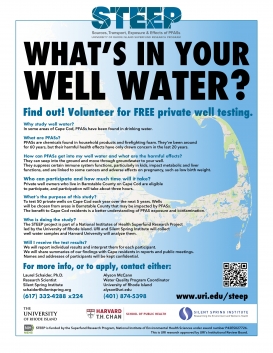Cape Cod study offers free private well testing for drinking water contaminants
 Barnstable County residents invited to have their private well water tested for harmful PFASs
Barnstable County residents invited to have their private well water tested for harmful PFASs
Private well owners in Barnstable County can now sign up to have their well water tested for the presence of harmful chemicals, called PFASs, through a federally-funded research study on contaminants in drinking water. The goal of the study, part of a larger effort called STEEP, is to better understand the extent of people’s exposure to PFASs through private well water, determine where the contaminants are coming from, and identify ways to limit the public’s exposure.
PFASs are a class of chemicals added to consumer products to make them non-stick, waterproof, and stain-resistant. They are also used in firefighting foams and industrial processes. The chemicals are showing up in drinking water supplies across the U.S., including the Hyannis Water System and private wells near Joint Base Cape Cod.
STEEP, a National Institute of Environmental Health Sciences Superfund Research Program Center, was established to address these emerging contaminants. The five-year project, led by the University of Rhode Island (URI), is a collaboration between URI, Harvard T.H. Chan School of Public Health Department of Environmental Health, and Silent Spring Institute.
“We’re concerned about people being exposed to these chemicals because of their potential impacts on health,” says Laurel Schaider, PhD, an environmental engineer at Silent Spring Institute who is co-leading the STEEP private well testing program on Cape Cod. Studies have linked exposure to PFASs with immune system problems, certain cancers, thyroid disruption, and adverse effects on pregnancy, such as low birth weight.
Schaider along with co-leader Alyson McCann of the URI Department of Natural Resources Science will be working with the community on Cape Cod to recruit volunteers for the study. “This is a great opportunity for private well owners to get information about the quality of their drinking water so that they can take action, if needed,” says McCann.
Participants will receive a detailed report with their results indicating which chemicals were detected and how their levels compare with other private wells in the study. The reports will also include general information about the chemicals, where they’re found, and various steps participants can take to reduce their exposures such as installing a water filtration system.
Eastham Health Agent Jane Crowley encourages private well owners to sign up to for the study. “I think it’s very troubling that these chemicals are showing up in our drinking water,” she says. “That’s why it’s important for the community to get involved by participating in this study, so we can better understand what’s going on and protect ourselves.”
Private well owners interested in having their private well tested can sign up through the STEEP website at: https://web.uri.edu/steep/wellwater. Participants will be asked to complete a consent form and questionnaire about their well. Based on the responses, the researchers will select 50 wells for testing each year over the course of the five-year project.
About STEEP: The Sources, Transport, Exposure and Effects of PFASs (STEEP) Superfund Research Program (SRP) Center is a collaboration between the University of Rhode Island, Harvard T. H. Chan School of Public Health, Department of Environmental Health, and Silent Spring Institute. Led by URI, the five-year project is addressing the emerging and expanding problem of poly- and perfluoroalkyl substances (PFASs) in drinking water—how these chemicals move through our environment, how we are exposed through our drinking water, and how they affect our health. Local project partners include the Massachusetts Breast Cancer Coalition and the Sierra Club Cape Cod Group.
STEEP is funded by the National Institute of Environmental Health Sciences (NIEHS).
For more information about STEEP, visit: https://web.uri.edu/steep/